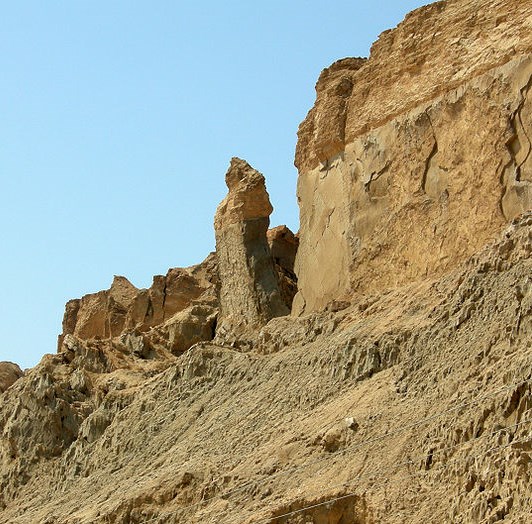Difference between revisions of "Lot's Wife and Her Fate/2"
(Original Author: Aviva Novetsky, Neima Novetsky) |
(Original Author: Aviva Novetsky, Neima Novetsky) |
||
| Line 61: | Line 61: | ||
<multilink><a href="RBachyaBereshit19-26" data-aht="source">Ibn Ezra cited by R. Bachya</a><a href="RBachyaBereshit19-26" data-aht="source">Bereshit 19:26</a><a href="R. Bachya b. Asher" data-aht="parshan">About R. Bachya b. Asher</a></multilink>,<fn>This interpretation is not found in the extant commentary of Ibn Ezra.</fn> | <multilink><a href="RBachyaBereshit19-26" data-aht="source">Ibn Ezra cited by R. Bachya</a><a href="RBachyaBereshit19-26" data-aht="source">Bereshit 19:26</a><a href="R. Bachya b. Asher" data-aht="parshan">About R. Bachya b. Asher</a></multilink>,<fn>This interpretation is not found in the extant commentary of Ibn Ezra.</fn> | ||
<multilink><a href="ChizkuniBereshit19-26" data-aht="source"> Chizkuni</a><a href="ChizkuniBereshit19-26" data-aht="source">Bereshit 19:26</a><a href="R. Chizkiyah b. Manoach (Chizkuni)" data-aht="parshan">About R. Chizkiyah b. Manoach</a></multilink>, | <multilink><a href="ChizkuniBereshit19-26" data-aht="source"> Chizkuni</a><a href="ChizkuniBereshit19-26" data-aht="source">Bereshit 19:26</a><a href="R. Chizkiyah b. Manoach (Chizkuni)" data-aht="parshan">About R. Chizkiyah b. Manoach</a></multilink>, | ||
| − | <multilink><a href="RalbagBereshitP19-17" data-aht="source">Ralbag</a><a href="RalbagBereshitM19-26" data-aht="source">Beiur HaMilot Bereshit 19:26</a><a href="RalbagBereshitP19-17" data-aht="source">Beiur HaParashah Bereshit 19:17,26,38</a><a href="R. Levi b. Gershom (Ralbag, Gersonides)" data-aht="parshan">About R. Levi b. | + | <multilink><a href="RalbagBereshitP19-17" data-aht="source">Ralbag</a><a href="RalbagBereshitM19-26" data-aht="source">Beiur HaMilot Bereshit 19:26</a><a href="RalbagBereshitP19-17" data-aht="source">Beiur HaParashah Bereshit 19:17,26,38</a><a href="R. Levi b. Gershom (Ralbag, Gersonides)" data-aht="parshan">About R. Levi b. Gershom</a></multilink> |
</mekorot> | </mekorot> | ||
<point><b>To whom does "וַתְּהִי" refer?</b> According to this approach, the referent of the verb is, not Mrs. Lot, but the land itself.<fn>These exegetes all suggest that it refers to the "אֶרֶץ" mentioned in verse 23, and thus the verb takes the feminine form. Alternatively, it refers to the "אֲדָמָה", mentioned in the immediately preceding verse 25 (thanks to Shlomo Katz for this suggestion).</fn></point> | <point><b>To whom does "וַתְּהִי" refer?</b> According to this approach, the referent of the verb is, not Mrs. Lot, but the land itself.<fn>These exegetes all suggest that it refers to the "אֶרֶץ" mentioned in verse 23, and thus the verb takes the feminine form. Alternatively, it refers to the "אֲדָמָה", mentioned in the immediately preceding verse 25 (thanks to Shlomo Katz for this suggestion).</fn></point> | ||
Version as of 17:41, 14 February 2015
Lot's Wife and Her Fate
Exegetical Approaches
Overview
Commentators present a spectrum of opinions regarding the fate of Mrs. Lot and the message of this section of the narrative. Many view it through the prism of sin and punishment, with the death of Lot's wife (like the destruction of Sedom around it) being a supernatural Divine retribution for one of a number of possible transgressions. A minority group, however, views this part of the story as belonging to the realm of the less overtly miraculous. This group subdivides, with some exegetes agreeing with the first approach that Mrs. Lot did meet her demise here, but only as an incidental result of her tarrying, and others positing that she actually survived the destruction of Sedom. These readings have implications both for our perspectives on Lot and his wife and for our understandings of how Hashem runs His universe.
Supernatural Pillar of Salt
Lot's wife miraculously turned into a pillar of salt.

- Divine presence – Pirkei DeRabbi Eliezer explains that the command was intended to prevent Lot and his family from seeing God's presence as it descended to destroy Sedom.2 According to this reading, Mrs. Lot's death was not a punishment for a sin, but rather the inevitable outcome of a tragic mistake.
- No more deserving than compatriots – Rashi suggests that since Lot and his family were not worthy on their own of being saved,3 it was improper for them to watch the destruction of their fellow sinners.
- Demonstrated a lack of faith – R. D"Z Hoffmann asserts that, by looking back, Lot's wife displayed a lack of faith that the angel's prediction would be fulfilled.4
Natural Death by Salt
Mrs. Lot was caught in the devastation wrought on Sedom. Like the rest of Sedom's inhabitants, she died in the onslaught of salt and brimstone, and was covered under a mound of salt.
Not Punished by Salt
The verse says nothing about the fate of Lot's wife. It simply tells the reader that she turned and saw how the land had been transformed into a wasteland of salt.
- Died – According to Ralbag, the absence of Lot's wife from the end of the story proves that she did in fact perish with the rest of Sedom. This was a consequence of her lingering,22 rather than a punishment for transgressing the command of the messengers and was not necessarily related to salt at all.23
- Lived – It is possible, though, that according to Ibn Ezra and Chizkuni, Mrs. Lot did not die at all. When the rest of the family decided to move from Zoar to the mountains, she might have decided to stay behind,24 and is thus missing from the end of the narrative.